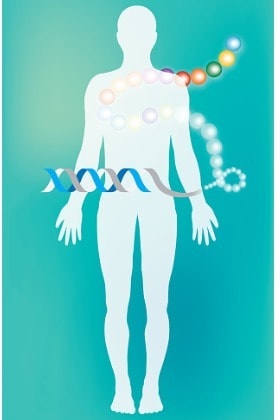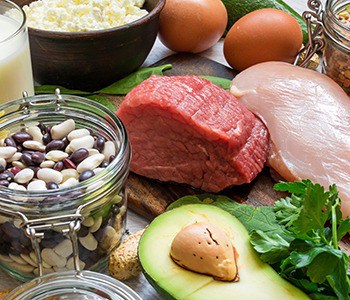What Is Tryptophan and Why Is It Essential for a Complete Protein?
In a hurry? Click here to read the Article Summary...
Tryptophan is a rather obscure substance that you don’t really hear that much about (except maybe when discussing turkey and that one episode of “Seinfeld”). But did you know that, without it, you wouldn’t be able to produce many of the healing hormones and other substances that both your brain and body need to survive? Tryptophan is also the “missing ingredient” in many collagen protein powder supplements. A collagen formula that doesn’t contain tryptophan is not a source of complete protein and doesn’t count toward the recommended Percent Daily Value for dietary protein.
What Is Tryptophan?

Tryptophan, also called L-tryptophan, is an essential amino acid. Amino acids form together in peptide chains to create proteins. Healthy proteins are a vital component of every cell in your body. They are the long-lasting, high-octane “building blocks” that keep the body flexible, strong, and healthy [1].
Too little tryptophan in the diet has an effect on health (as can too much). Low tryptophan has been connected to hormonal and reproductive system imbalance and slow growth rates in adolescence as well as an increase in the severity of mood disorders [2, 3].
Tryptophan and Niacin
In particular, L-tryptophan is used to make key nutrients for both brain and body. It’s essential for the creation of the B vitamin niacin (B3), for example, since it helps the liver synthesize this vital nutrient [4].
Vitamin B3 is important for skin and nerve health as well as digestion. Just the right amount can lower cholesterol, help with inflammatory conditions like arthritis, and boost brain function.
A 2005 report published in the American Journal of Cardiology found that out of five lipid-modifying agents given to over 8,000 men with a previous history of heart attack, only niacin significantly reduced the risk of another attack during a 6-year period [5]. Remember, B3 can only be produced with the help of L-tryptophan.
Tryptophan and Serotonin
We also need L-tryptophan to create the hormone serotonin [6]. Serotonin is an important neurotransmitter, meaning that its job is to “transmit” messages between nerve cells. It’s often called the “happy chemical” because it plays a key role in regulating mood.
Adequate amounts of serotonin can create feelings of well-being, relaxation, and happiness. Research over the last 50 years has connected low serotonin levels to depression [7]. As a side note, this is a key reason why many common antidepressant drugs on the market these days are SSRIs, which stands for Selective Serotonin Reuptake Inhibitors. SSRIs treat depression by increasing the amount of serotonin in the brain.
Serotonin is also necessary for the body to produce the hormone melatonin.
Melatonin Is Important for Good Sleep
Melatonin serves many purposes in the body, but the most important role is as the primary regulator of the sleep/wake cycle (also called the circadian rhythm). Sleep researchers at the Swiss Psychiatric University Clinic aptly describe the powerful hormone melatonin as the “internal sleep ‘facilitator’ in humans [8].”

As an essential amino acid, L-tryptophan is a foundational element. Since it helps in the creation of serotonin, it’s a vital component in the production of melatonin too.
You can think of these connected substances like parts of a house. The roof (melatonin) cannot be built without the walls (serotonin), and the walls cannot be built without first laying a solid foundation (L-tryptophan).
Where Do You Get L-Tryptophan? (It doesn’t just come from turkey)
L-tryptophan is one of those substances (like vitamin C) that the body can’t make on its own. You must get it from the foods you consume or as a supplement. Yes, turkey contains tryptophan, although more than likely that’s not the reason why you get sleepy after a big Thanksgiving meal. That probably has more to do with overeating than anything else (wink, wink).
Tryptophan is actually found in many different kinds of protein-rich foods, such as other types of poultry, beef, cheese, yogurt, eggs, and fish. Vegans and vegetarians are able to obtain tryptophan from plant-based sources such as:
- spinach
- tofu & other soy
- cooked beans
- quinoa
- buckwheat
- oat bran
- nuts
- seeds such as chia, hemp, and pumpkin
Complete Protein Includes L-Tryptophan
All of the animal-based foods listed above are examples of “complete proteins.” There are roughly 20 different kinds of amino acids found in nature. Some of these amino acids our bodies can produce. Others, it can’t. The specific amino acids that the human body can’t produce are referred to as essential amino acids. Therefore it’s “essential” that you get these amino acids from the foods you eat [9].
Complete proteins are foods that contain all nine essential amino acids, including L-tryptophan.

For meat-eaters, getting all your essential amino acids isn’t usually an issue as all animal proteins (i.e., meat, eggs, milk, cheese, dairy) are complete proteins. Beef is a particularly good source. According to studies that go back to the 1980s, red meat contains 18 of the 20 essential and non-essential amino acids as well as dozens of vitamins and minerals [10].
If you’re vegan, you’re hopefully very aware of the need to consume plant foods that are complete proteins (see list above) as well as knowing how to combine foods to provide your body with all the essential amino acids.
Most Collagen Supplements Are NOT Complete Proteins
Collagen is a protein since it is made up of amino acids. But it is NOT a complete protein source because it lacks adequate tryptophan. This is the case with the endogenous collagen that is created inside your body as well as the majority of collagen products on the market today. They can’t be relied on as a source of complete protein, no matter how many collagen types they contain.
A few high-quality collagen protein powders will contain added tryptophan to make it a complete protein and a better source of overall nutrition for you. Organixx Clean Sourced Collagens is such a product.
Not only does Clean Sourced Collagens contain collagen types I, II, III, V, and X, vitamin C, silica from horsetail extract, and zinc, it also contains 150 mg of L-tryptophan per serving, to give you a source of complete protein.
What’s more, Organixx Clean Sourced Collagen is non-GMO and made from the cleanest and best sources available. It’s free from artificial flavors, preservatives, colors, yeast, soy protein, added sodium, and starch.
If you’re searching for a complete protein collagen source that includes L-tryptophan, look no further. Organixx Clean Sourced Collagens is scientifically formulated to help you look and feel your best.
Organixx Clean Sourced Collagens blend contains five types of collagen from four sources. What’s more, it’s combined with targeted nutrients such as zinc, vitamin C, and vitamin B6 which specifically enhance the bioavailability and potency of collagen. Clean Sourced Collagens is formulated from the ground up to enhance and support your body’s natural ability to heal and rebuild itself from the INSIDE out.

 Sources:
Sources:
Article Summary
Tryptophan, also called L-tryptophan, is an essential amino acid.
L-tryptophan is used to make key nutrients for both brain and body. For instance, it’s essential for the creation of niacin (vitamin B3).
Tryptophan is a foundational element in the creation of serotonin and melatonin.
Tryptophan is found in many different kinds of protein-rich foods including poultry, beef, cheese, yogurt, eggs, and fish. Vegans and vegetarians are able to obtain tryptophan from plant-based sources.
Complete proteins are foods that contain all nine essential amino acids, including L-tryptophan.
Collagen is a protein since it is made up of amino acids but it is NOT a complete protein source because it lacks adequate tryptophan. This is the case with the collagen created inside your body as well as the majority of collagen products on the market today.
A few high-quality collagen protein powders such as Organixx Clean Sourced Collagens contain added tryptophan to make it a complete protein and a better source of overall nutrition.




I'm a bit confused. I already have some of your Clean Sourced Collagens Anti-Aging Blend, bought from you several months ago, dated "best before" June 2021. It says nothing on the front label about Tryptophan, but on the back, under Amino Acids Profile, Tryptophan 10 mg per serving is listed.
So what is new or different about the product you are promoting here, except that it actually SAYS Tryptophan on the front? Is there more Tryptophan now, or maybe less?
I'd appreciate a clarification. Thanks very much, in advance.
Hi Susan Barnabe, thank you for your question.
We'd be more than happy to give you some more information on our new and improved Clean Sourced Collagens formula and go over some of the benefits with you.
While it may not seem like a big change, it is a pretty important one. The only thing that has changed is the amount of the amino acid Tryptophan. Our previous formula had 10 mg while our new formula contains 150mg. Most collagen proteins are considered “low-quality” proteins because they’re missing this amino acid which means most collagen supplements can’t be used to replace dietary protein. We’ve added an extra 140 mg of tryptophan per serving to ensure you’re getting (and absorbing) a complete protein.
You may reference the following product label here:
https://cdn.shopify.com/s/files/1/1569/1827/products/csc-back-label_2400x2400.jpg?v=1586204172
We're also excited to announce that our Clean Sourced Collagens are now in new environmentally friendly flex packaging containers rather than canisters. As a result, only 20 servings will fit per package. Please know, that our price has been reduced to compensate for the lower servings making the per-serving price the same as it was before.
For more details, you may check out the following links:
Product Shop Page/Customer Reviews:
https://shop.organixx.com/products/clean-sourced-collagens
Product Details:
https://ox2022.organixx.com/collagens
FAQs:
http://bit.ly/support-comm-fb
We hope this helps and wish you a lovely day.
I have varicose veins, understand collagens may help in getting rid of them, true and does this product?
Hi Peps, thank you for your question.
Unfortunately, we do not have any information on whether or not Collagen can help with varicose veins.
Our Clean Sourced Collagens was designed to help...
- Promote healthy hair, skin, and nails
- Support optimal joint function and mobility
- Improve digestion and overall gut health
- Boost your metabolism to burn stubborn fat
However, we do have an article that we recently published that goes over the "12 Top Essential Oils and Their Uses" and it discusses how Rosemary Essential Oil would be beneficial for varicose veins.
Feel free to check out the article here: https://ox2022.organixx.com/essential-oils-and-their-uses/
Also, we do carry Rosemary Essential Oil in our product line. You may visit the product page for more details:
https://shop.organixx.com/collections/essential-oils/products/rosemary-essential-oil
We hope this helps and wish you a happy & healthy day!
On the back label list of ingredients, I don’t see Tryptophan listed with the other amino acids, and I see no amount given in the callagen blend ingredients where it is listed. Why not? You said you have greatly increased the anount frim 10 to 150mg’s. (?)
Hi Chris, thank you for your interest in our Clean Sourced Collagens.
Yes, unfortunately, there seems to be a bit of a glitch with the product label on our website. Please know, that it is in the process of being corrected. In the meantime, you can access the correct ingredient label here:
https://support.ox2022.organixx.com/scripts/file.php?file=mu5cy5h7p4i0rbiaudj2cuk9ap32ot1t
If you have any trouble viewing the information provided above, you can reach out to our Customer Success Team and they will be more than happy to provide you with the link to the correct Clean Sourced Collagens product label. You can send them an email by submitting a support ticket here: https://support.ox2022.organixx.com/submit_ticket.
We hope this helps and wish you a lovely day.
On the back label list of ingredients, I don’t see Tryptophan listed with the other amino acids and their amounts. I see Tryptophan in the group of multi-collagen blend listing, but again, no amount. Why not?